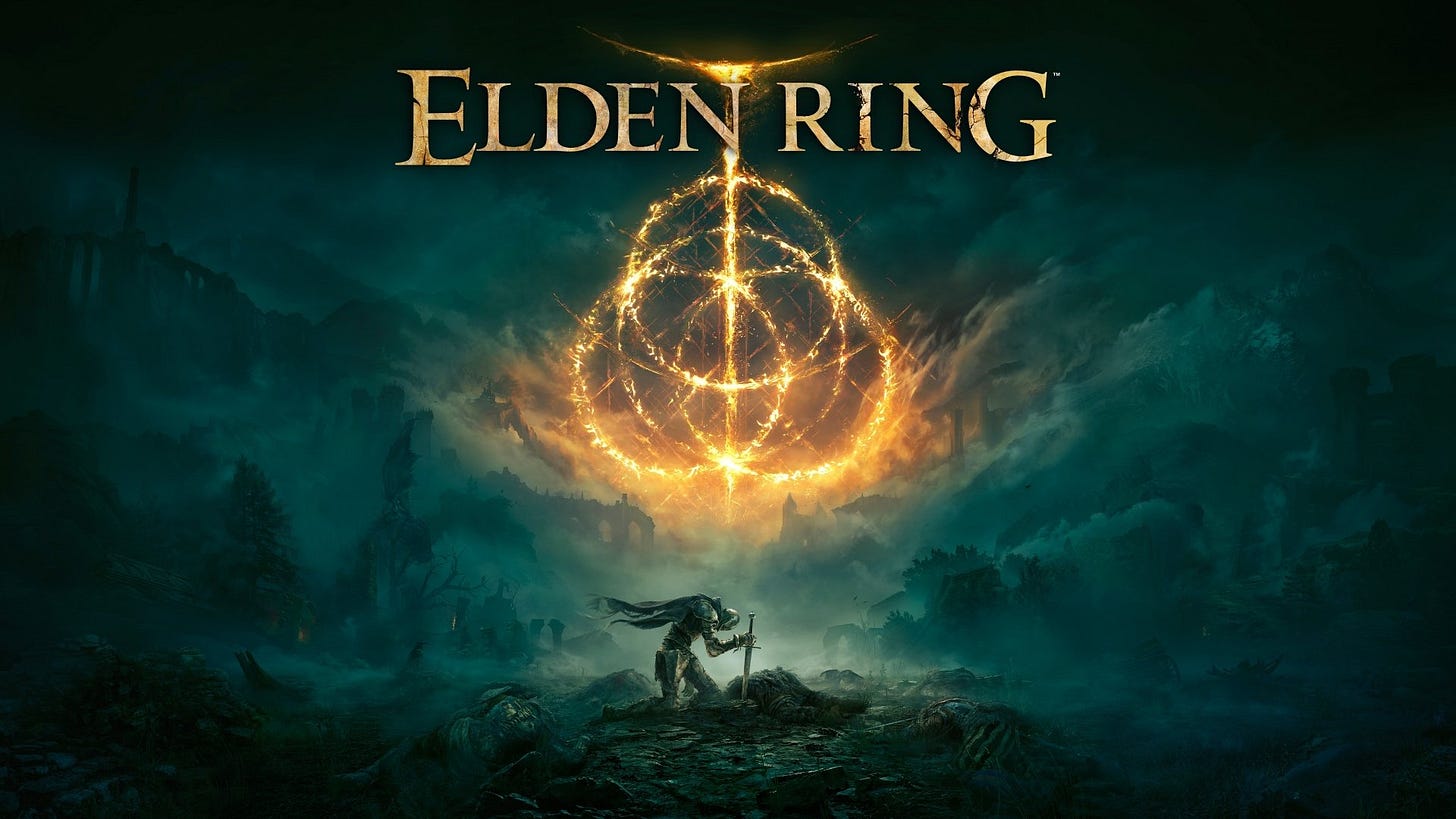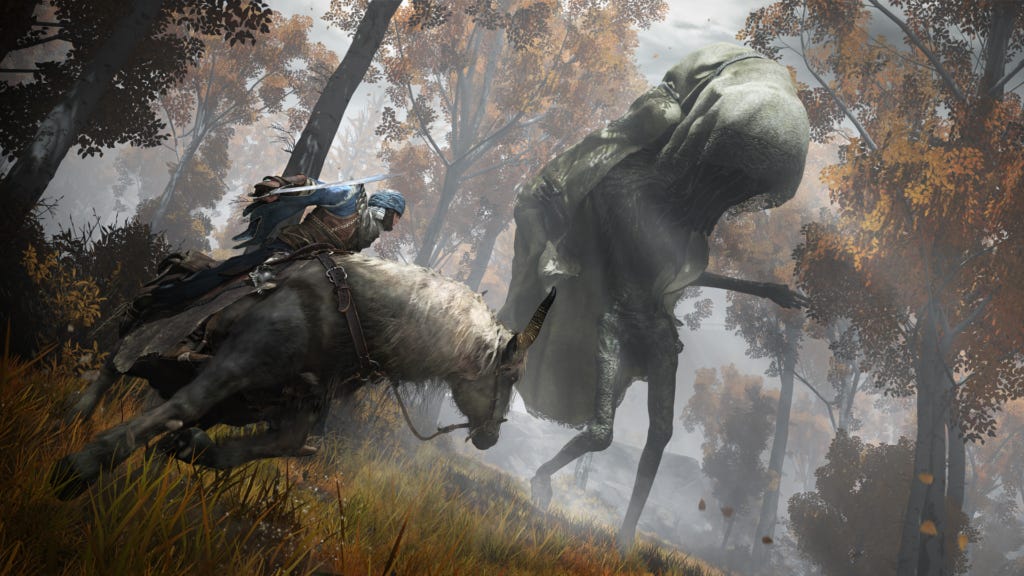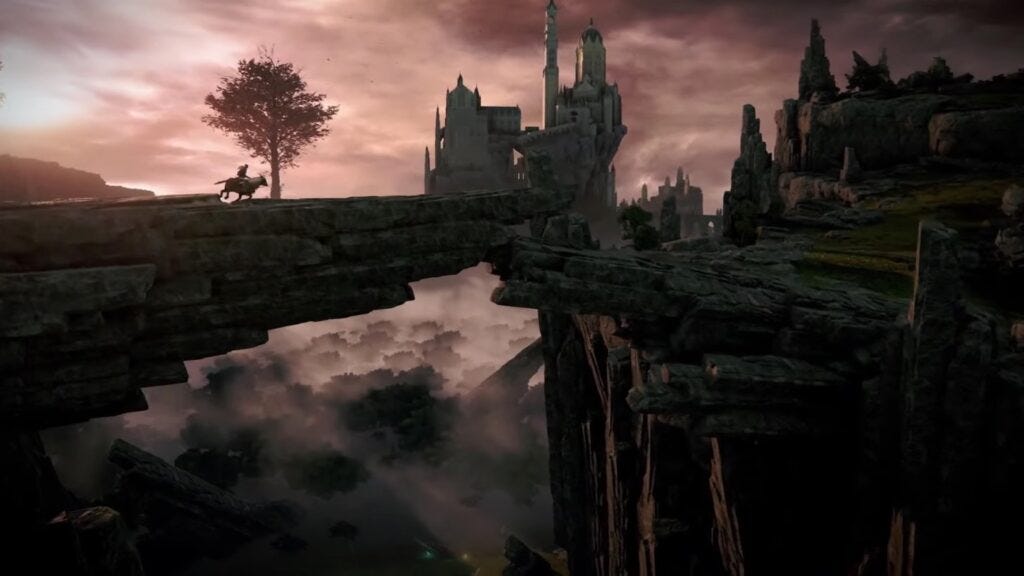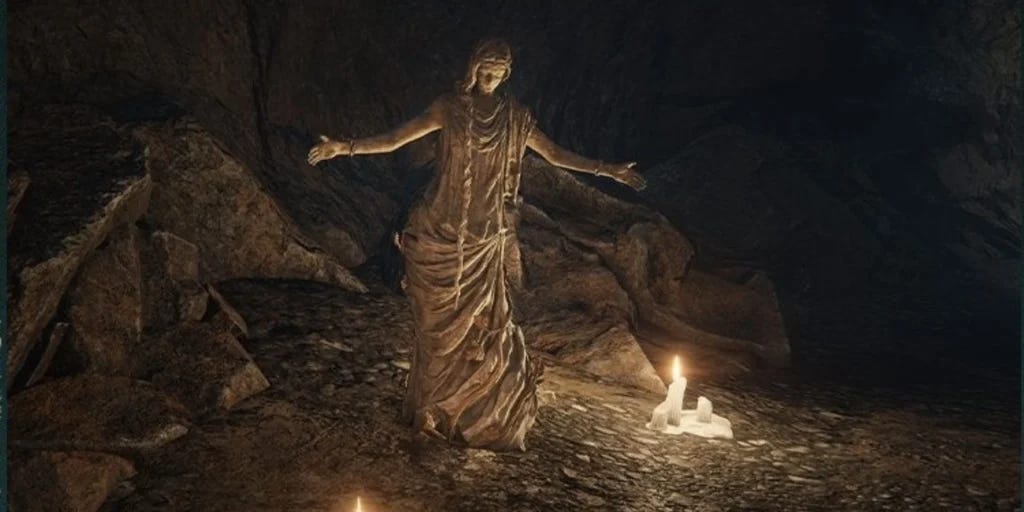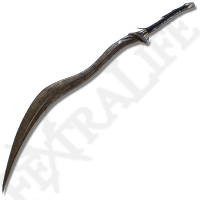Dark Souls is the best series ever. Not only is its combat unimpeachable, but the ludonarrative consonance unparalleled; the story, among the best of the medium; the gameplay, tight and engaging; the world, engrossing; the level design, immaculate. Dark Souls has no flaws. The immense challenge of each boss fight is the pinnacle of difficulty in video gaming. If you don't think so, you're probably just a scrub who needs to get good, and you might have an extra chromosome, too.
Everyone agrees. Critics, gamers, brothers, friends, even Yahtzee. Play enough and you'll learn to like it. What kind of degenerate doesn't like Dark Souls?
This is the impression one receives of the discourse surrounding these games, anyway.
Ever since I gave up on the first Dark Souls c. 2011, I've more or less accepted this line of thinking. The fault was not in Hidetaka Miyazaki, but in myself. I wasn't patient enough. I wasn't good enough. I didn't have the attention span to decipher the story's enigma. People I respect told me I was wrong to dislike the systems: I trusted their judgement. And until I managed to finish one of From's games personally, I wouldn't be in any position to rule otherwise.
This has been something I've tried to do for the last ten years. I skipped Dark Souls 2 because I didn't like the first game, but I did play Dark Souls 3. I enjoyed it to a point, but got stuck on a boss--and gave up. I tried Bloodborne, but the first boss, the framerate, killed me in one shot, and I decided it was unplayable. I made it to the first ogre in Sekiro, but I was so bad that I couldn't beat him even after ten thousand tries, and I gave up.
These three experiences more or less reinforced my impression that the problem was me. From and I just didn't get along. That's okay. I don't like coffee, either; I don't need to go around telling people that they were traumatized as children because they spend a trust fund at Starbucks each month, even if that's what I think whenever I walk through my local library.
The Elden Ring Cometh
But here enters Elden Ring. It's an open world. It has a horse. George R.R. Martin was paid to put his name on it. I heard there were checkpoints. It looked kind of neat. Maybe I'd enjoy it? Maybe this would be where I learned to love Dark Souls?
Let it be made clear that Elden Ring is a Dark Souls game. If I hadn't been told its setting was new, I wouldn't have noticed it was different. It retains every feature of Dark Souls. Bonfires are now called Sites of Grace for some reason, and you no longer turn into a corpse when you die, but the mechanics are the same. The messages that flash across the screen are the same. The enemies look the same. The combat is the same. I am convinced they could have called this Dark Souls 4 and no one would have blinked an eye.
The mechanistic distinctions between the former series and this new entry are therefore subtle, excluding the fact you now have a horse and are let loose on a The Elder Scrolls-reminiscent open world. I'll explore this in more detail later on.
For now, it should suffice for my purposes to say that I did manage to beat Elden Ring. I liked it, too, for the most part. But I didn't have a Come To Miyazaki moment. When Elden Ring is being The Elden Scrolls, it's an engaging open world experience. When it's being Dark Souls, it's as tedious and frustrating as I remember the first game being eleven years ago.
No Hands Held
Something that has irked me over the last two weeks is the insistence that Elden Ring is the first "open world" Soulsborne game. This is true only in the most literal sense. All of the preceding FromSoft titles are what I would call effectively open world in design principles. You were never compelled to complete zones in a specific order, and the zones themselves were hardly railroads.
The difference is that the environments themselves were confined to chokepoints. The way ahead was always clear. The freedom of movement more constrained. Not so in Elden Ring, where the map is as open as any other game's from the moment you find your first Site of Grace.
And you are given effectively no guidance whatsoever. No markers on the map. No quest objectives. Not even a quest, really, except Become Elden Lord. What does it mean to Become Elden Lord? I don't know, but I presumed it was code for "kill all the bosses" (it was). Thus I set off in search of bosses to murder, for no particular reason other than that I needed to extract some enjoyment from this product I paid $65 for.
First I went north. That worked, until I came to a bridge, where some guy named Godrick wrecked me ten times. I decided to go south then instead. I found dungeons, leveled up, got loot, killed minibosses. By then I was strong enough to return to Godrick, and this time I got the better of him.
This is the basic procedure of Elden Ring. Ride in one direction until you hit a wall, then go in another. I think that's more or less true for the Souls series as well, but the open worldification makes a huge difference. It feels great to turn around, explore, and find new stuff. Progression is a compelling incentive to engage with the world. Compare this state of affairs to that of a game like Skyrim, in which exploration never earns you anything at all except the misery of having to keep playing, and you see a clear difference. A huge, sprawling open world makes sense for Elden Ring more than almost any other game, from a strictly systems design standpoint, because leveling up and upgrading equipment is so important for progression. The level of challenge demands engaging with exploration--you can't win otherwise. This is why, in general, I say that 'hard' games are better than 'easy' games. A 'hard' game demands engagement with its systems, which is very rarely a bad thing.
In Skyrim, there's no intrinsic reason to explore. You do it only for the extrinsic reward of enjoyment in discovery. Not so in Elden Ring. There is joy in discovery here, but it's also fundamentally important to handling the game's combat.
And as in Breath of the Wild, you have to figure the world out on your own. Where to go next? Which step to take?
A game like Red Dead Redemption 2 puts an objective marker on your map. You follow it. Then you jump into a rollercoaster car and do what the designers tell you to do. This style of design effectively outsources all of the thought required to Rockstar. It turns the player's brain to mush; a zombie could beat the main story. What's the point in building a huge, detailed open world when the developers don't let you engage with it on anything but their terms?
Elden Ring is different. Your brain is a necessary ingredient in having fun.
It's fantastic to play a game like this that doesn't hold hands. I hate mindlessly following map markers for seventy hours in Ubisoft games. The best part is that there are no stupid puzzles like Zelda: Elden Ring is a game with a focus on exploration and combat, an action game, but it still lets you take the reins in the open world. Very few titles do that nowadays. Those that do are invariably Japanese.
My one contention in this regard is that a miniscule amount more guidance would have been appreciated. I don't mean map markers, but some sort of indication for which zone to focus on at what level. I don't even want numbers, just some idea: 1% more than what's currently present would have been enough. There came numerous points where I would enter a zone, get wrecked, and find myself unsure if I were underleveled to be fighting its specific enemies, or if I were approaching them wrong, or if I were just a scrub who needed to get good.
It can be very hard to tell the difference between these three potentialities.
I didn't want the game to be explicit in what the recommended level for a zone was, but some sort of indication would have been appreciated.
Checkpoint
Elden Ring is full of Bonfires--I mean, Sites of Grace. They're everywhere throughout the open world. The designers were extremely generous, which means the amount of reptitive mobclearing required is significantly reduced over previous From games.
They've also introduced a checkpoint system called Stakes of Marika.
Stakes of Marika are usually placed outside boss rooms. Get killed, respawn by the stake with all your flasks replenished. No need to fight through any monsters.
The addition of Stakes, and the general improvement to Bonfire placement, prove to me that what I've long thought about Dark Souls is actually true: I would enjoy From games a lot more if they had a quicksave function. What killed Dark Souls 3 for me was the amount of repetitive grinding required. Clearing through the same enemies again and again on your way to the boss you're stuck on is a terrible slog.
Not so in Elden Ring. Here progression is much faster.
There are similar changes to reduce needless death. Killing specific enemies now replenishes your charges of Flasks, which I believe is a new addition. This can make exploring large dungeons far less punishing. It can, however, be frustrating when a random pack of wolves replenishes three Flasks, but a giant miniboss fire prelate doesn't replenish any.
Checkpoints, regular Bonfires, and the opportunity to replenish Flasks do not make the game easier. The challenge hasn't been reduced, at least not significantly. The game is still hard. But it's far, far less tedious, and as a result much more playable for someone like me. These improvements are why I finally managed to finish this game.
Become the Elden Lord
They say George R.R. Martin helped build the world for Elden Ring. You could've fooled me. I would bet money he had nothing to do with it. Just like Dark Souls, Elden Ring takes place in a dark, vaguely European fantasy setting, overrun by grotesque demons, overflowing with enigma. This time you play a Tarnished, which is something. You need to become Elden Lord, for some reason. You collect Souls--I mean Runes!--to level up. You respawn at Bonfires--I mean Sites of Grace--when your humanity is lost--wait, no you don't, you just respawn at Bonfires, by which I mean Grace, because you're a Tarnished...
Elden Ring might have a story. It might even make sense, if you really pay attention. I spent about fifteen minutes trying to decipher the impenetrable enigma of poorly written archaic dialogue at the start of the game; finding this impossible, I decided it wasn't worth the effort. I skipped every cutscene past the five hour mark. I don't feel like I missed much.
I strongly dislike the narrative presentation of From's games. The map is filled with places sincerely named after the same fashion I would ironically name dungeons in my Torchbearer campaigns: The Bridge of Iniquity, Castle Morne, Volcano Manor. Maybe they sound better in Japanese. Every monster, and most of the bosses, are so grotesque that they're indistinguishable. It's like the artists had a contest to see who could tack the most arms on to a single entity. They all look the same. They're too monstrous to be memorable.
Then NPCs talk at you, explaining the story through cryptic anachronisms, and it's enough to make me want to blow out my own brains. The strange combination of a generally Western aesthetics with clearly Japanese storytelling short-circuits my ability to pay attention. It gets on my nerves, honestly. That's why I played the entirety of this game while listening to audiobooks.
And as a platform for listening to audiobooks, Elden Ring is the best I've encountered since Classic WoW.
Fight!
Anything I say about Dark Souls combat will probably lead to me being made fun of online, so I'll restrict my commentary to the new horse mechanics. The horse, Torrent, can be summoned with a button press. He runs moderately fast and jumps fairly high. Combat while mounted works more or less like it did in The Witcher 3, except ten million times more refined: light or heavy attack, left or right. If your blade is lowered while your attack is charging and it collides with the enemy, they'll take additional damage from being skewered.
Slicing people to pieces on horseback never ceases to be fun. It's easily my favorite part of exploration. You feel like a knight wading into battle. Most fights against dragons are done while mounted, and they're always kick-ass.
But the mechanic is underdeveloped. The lack of invulnerability frames while dodging makes boss fights while mounted wonky, to say the least. You're mostly reduced to hitting the boss once, riding away, riding back in, hitting him once, riding away, etc. This strategy more or less always works. Torrent can't be leveled or upgraded, either, which means he's always extremely vulnerable to being instantly annihilated by spearmen or dragonfire. You can't block while on horseback or use special skills, so there isn't much to master. And as for movement, you stop more or less on a dime: no need to pull on the reins as in Red Dead.
These sound like worse grievances than they are in practice. Horse combat is still tons of fun. My real criticism of the horse is that he isn't present at all for the last third or so of the game, which take place in dungeons. You can't use him on any of the final boss fights or in any of the final zones. He's basically relegated to the corner. It's enough to make you wonder if the designers realized the issues with the horse's implementation, but didn't know what to do to make it work.
Cautious Comments on Progression
I played the Vagabond Knight class because it was the first listed in the archetype selection list and therefore, I figured, the easiest. I never once cast a spell or leveled anything except Vigor, Endurance, and Dex. About five hours in I found a badass curved greatsword called the Bloodhound's Fang, and proceeded to literally never use any other weapon for the rest of the game.
For fifty hours, this was my only weapon. It dealt the most damage (once upgraded), caused bloodloss, and had a tremendously overpowered special backflip ability. It was also very long, which made it fantastic on horseback. I never found any other weapon that scaled so well with dexterity, not even at the very end of the game.
I wore my starting Vagabond armor for about twenty hours before I finally stumbled upon something better. After that I found tons and tons more armor--it was like I climbed to the top of Mount Everest, searching desperately for loot, when an avalanche of gear flooded down onto me.
I mention both of these points now to illustrate some trepidation I have over the quality of Elden Ring's progression. The level progression systems work extremely well; I never once sat down to grind Souls, and I never found myself stuck. There was always somewhere else in the world to go where I could make progress at my current power level.
But the loot progression leaves something to be desired. There's an entire library of 'Ashes of War,' special abilities to equip on weapons, but the Bloodhound's Fang's ability was so good that I never felt any need to experiment. I wasn't allowed to, anyway; as a unique armament its Ash of War was fixed and impossible to change.
I would have enjoyed the game more if I'd found more reason to change my gear with greater frequency. As it was, for the most part, loot was pointless. I never needed a new weapon. I changed armor three times throughout my whole playthrough. Most of what I found was junk.
Crafting
Speaking of junk, Elden Ring has crafting mechanics. I never crafted anything except piece of turtle meat that cured me of a poison status effect. I would criticize the game for clogging my inventory with piles and piles of shit I didn't care about for use in crafting mechanics I also didn't care about, but then I managed to beat the game without hardly ever thinking about crafting at all.
If a game is going to have crafting, this is how it should be.
Some Minor Frustrations
Camera Controls
Elden Ring has the worst camera put into any game since the PS2. It's laughably bad. The acceleration changes depending on whether or not you're currently engaged in combat, making it impossible to turn around if you're running away from someone. Target lock-on is complete dogshit. Most of the game's bosses are so huge, and the camera so close to the player's model, that you can't see them if they ever decide to fly into the air (which they do, often). When you can see them, they'll block your entire screen--good luck figuring out what move they're about to use when your camera is inside the dragon's ass. Inside confined areas you better be careful not to get pushed into a corner by an enemy, because if you are pushed into a corner or against a wall, the camera will get stuck. You'll be unable to see anything. Then you will die.
The camera is the worst part of Elden Ring. More than anything else, it's just too close for the scale of the enemies being fought. There needed to be a button for 500% zoom. That would have made the game so much more playable. As it was, I found myself more frustrated at the camera than anything else. Truly, the camera was the real final boss.
Stagger Me Timbers
Why do I need to watch a seventy second animation every time I fall off Torrent? Does it really need to be this long? Is the game improved by having to watch my braindead character stumble up to her feet for ten hours whenever she's knocked down? Would it be less hardcore if these animations were reduced to one second? It would sure be a lot less tedious!
Multiplayer
One of the main reasons I gave in and bought this game was so I could play with my brother and a few of my friends. I hadn't expected the coop implementation to be so dreadful. Here's the rundown: in multiplayer, you can:
Fight bosses;
Kill trash mobs in the immediate vicinity of bosses.
In multiplayer, you can't:
Ride your horse;
Leave the current zone;
Enter into dungeons;
Fight any number of minibosses, for no real reason.
I summoned my friend into my world. He led me to a dungeon. This took an hour, because we weren't allowed to use our horses. We got to its entrance; the door was blocked by a field of light. I had to kick him out of my world, step over the threshold, then resummon him. Then we could do the dungeon.
What?
I know the technology for open world multiplayer hasn't been developed yet, we are in the very early days of netcoding here, but I think From could have worked it out. World of Warcraft only came out 18 years ago.
Coop is extremely underwhelming. It works for bosses and nothing else. You can't use it for exploring at all. We spent more time fighting against the system than we did playing the game. They've also removed the fun humanity element, so now you just use Tarnished Furled Fingers, a random crafting item, to summon other players. This isn't half so charming, and is ten times more tedious.
Upgrade Systems
To upgrade my Bloodhound's Fang, I needed a Somber Smithing Stone (1). Then I needed a Somber Smithing Stone (2). Then a Somber Smithing Stone (3). Etc. There came a particular point of frustration when I needed (7), but already had (8) and (9). All upgrades are done in this same way: there's no distinction between reagents of a type except a small bracket indicating a number.
The distinction between Somber Smithing Stone (7) and Somber Smithing Stone (8) would feel less arbitrary if they were named, say, Large Somber Smithing Stone and Gleaming Somber Smithing Stone. As it is, this was a very frustrating system to interface with. From has always been good about interweaving narrative with systems design, but this is a significant failing in that regard. It's a minor point overall, but it's also one that's constantly in the player's face.
It also doesn't help that the first time you pick up 1 Smithing Stone (3), you're going to think it's 3 Smithing Stone (1)s. I know I sure did.
The Elden Scrolls vs. Dark Ring
It should be clear by now that I most enjoyed Elden Ring when it was imitating Oblivion, but with good combat. That game is excellent. What I didn't enjoy was Dark Ring--that is to say, when Elden Ring was simply being a new Dark Souls entry, which is pretty much the whole third act of the game.
No horse. No checkpoints. Few if any enemies who replenish Flasks. A mostly linear environment. A boss at the end of the tunnel. I don't know how else to describe these sections except as dungeons, in some places so reminiscent of the first Dark Souls that I was having PTSD flashbacks. These are the parts of the game where exploration is de-emphasized and the tedious mastery of specific sections of combat come to the forefront. Clear out a dozen zombies, take a right, fight the miniboss, take a left, kill the dude with the axe, jump down to the boss, fight him, die like an idiot, repeat.
It's Dark Souls.
I was enjoying Elden Ring enough that I wondered if I would finally like the Souls series now, but my frustration at the grindiness and repetition of these dungeons assured me I wouldn't. What enabled me to finish ER was the dynamic, systems-driven exploration with its compellingly crafted open world. This hardcore, combat-focused gamer aRPG stuff really isn't for me. It's okay in small sections, like a keep that has to be cleared out, but large, protracted, linear, plot-required levels were not fun. In general I don't like From's levels design; I find it too punishing, too labyrinthine, too frustrating. Not hard per se, just tedious.
But most people won't have that problem. Most people like Dark Souls, and they'll enjoy Dark Ring just as much as they will The Elden Scrolls.
Conclusions
I don't know if I would've finished Elden Ring if I hadn't made up my mind to claim the moral victory that is finally overcoming a From game. If I hadn't known I wanted to write this review, I'm not sure I could've sustained the desire to keep going past Lyndell.
But I think I would have. Every few hours, for the last two weeks, I've developed a spontaneous compulsion to go sit down in front of my PS4 and get back into the open world. I'll play for a while, then quit after finding myself too frustrated. But give it another hour or four and I'll be back--I can't help it. I have to keep going. So while I can't say I loved Elden Ring, although I can say I mostly liked it, it clearly has something that makes it compelling.
Games like that are rare, and they're almost always worth playing. So I do recommend Elden Ring. It's definitely worth playing, if for nothing else than to see how to do exploration in an open world right for a change.
I played on a PS4 Pro. The game ran acceptably for the most part, with only a few framedrops in big boss fights. It took me ~50 hours.


